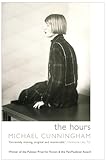 The Hours by Michael Cunningham
The Hours by Michael CunninghamMy rating: 5 of 5 stars
With a dramatic, heavy start (of how Virginia Woolf had drowned herself, with a big stone in her pocket) started “The Hours”, by Michael Cunningham. A very special book, unique in its delicacy, but also in its subject: a book after a book…and not only. Inspired by Virginia Woolf’s famous novel, “Mrs. Dalloway”, Michael Cunningham recreated in “The Hours” a day from three women’s lives: a woman who writes the book, a woman who lives the book and one who reads it. They are women from three different (and successive) generations, but all of them are confronting their existence, mortality and sexuality. They are women whose interior life is much richer than their exterior one. They are women who love, in essence, the beauty of life and who enjoy the life as long the life is bearable.
The beauty of life can mean flowers, a party, a fresh summer morning, a city, a lovely apartment and its comfort, a tinny bird on its flower dead bed, a new beginning or just few hours to freely read. But the beauty of life could be also an escape or that moment of conscientious decision between life and death.
I found surprising the freshness and, as I said, the delicacy with which Michael Cunningham rewrote a book … about women. It is not only the recreated style of “Mrs. Dalloway” that impressed me, but the deeply understanding of women’s nature. Cunningham managed in “The Hours” (and with the help of time) to explore and develop themes and motives that Virginia Woolf only sketched them or made allusions to them. The condition of woman in the twentieth century, for instance: from a perfect host, to the inexperienced but devoted housewife, and further to the self-confident and trustful friend. Or the exploration of women’s sexuality; from a woman’s daring kiss on her sister’s lips, until the public and committed relation with another woman.
In “The Hours” we miss London, but we have New York. We miss Big Ben’s strikes that marked the hours, but we have the years that smartly connect lives, deaths, and women with a book.
View all my reviews
2 comments:
Am scris din greseala un comentariu la acest post ceva mai jos. Scuze.
Arthur, in exact ceea ce spui tu mai jos consta diferenta esentiala dintre cartea lui Cunningham si filmul facut dupa cartea lui. Filmul e, intr-adevar, deprimant si accentueaza, forteaza chiar, ideea de sinucidere, folosind pentru asta personajul Laura Brown. In carte, Laura Browan n-are niciun moment intentia de a se sinucide; e, probabil, doar in faza de depresie. Dimpotriva, citind Mrs. Dalloway, ea chiar isi pune intrebarea cum, cineva care a scris o carte atit de plina de viata, se poate sinucide, afundindu-se hotarit in riu, cu un pietroi in buzunar!! Insa se stie, Virgina Woolf a fost maniac depresiva, iar Richard, artistul bolnav de SIDA este tocmai Septimius Warren Smith din cartea Virginiei Woolf, personajul alter ego al Clarissei, special creat pentru a o lasa pe Mrs. Dalloway in viata.
Totusi, in economia filmului, faptul ca Laura Brown devine personajul "vector" pentru ideea de suicid are sens. Altminteri ar fi fost foarte greu, daca nu imposibil, sa fie redat cinematgorafic acel "stream of consciousness" caracteristic Virginiei Woolf si excelent imitat de Cunningham.
Sunt, intr-adevar, putini barbatii care reusesc sa fie empatice cu femeile. De obicei, barbatii care au fost crescuti printre femei -o matusa, o bunica foarte apropiata- reusesc sa le inteleaga mai bine, sa vada dincolo de o anumita masca. N-am citit cartea, am vazut filmul de vreo doua ori. Mi s-a parut prea deprimant chiar si pentru mine. Exista un moment al depresiei cand incepe discutia despre sinucidere. Atunci se instaleaza o anumita stare despre care as putea spune ca nu este tocmai ceva normal. Vreau sa spun ca discutia despre sinucidere e una, in timp ce ispita ei este altceva. Or, dupa parerea mea, a avea ispita sinuciderii este un semn foarte rau, deloc spiritual, cum se crede, ci mai degraba clinic. Cand te paste sinuciderea e semn ca ratezi, ca esti blocat, ca te-ai bagat prea tare in probleme. Un om normal are capacitatea de a se retrage din seriozitatea lucrurilor, de a recurge la placeri mici si imediate pentru a-si reveni (si chiar la divertisment futil). Avem nevoie sa ne distram ca sa putem merge inainte. La un moment dat, trebuie sa stii sa-ti bagi picioarele. Tocmai de aceea, nu prea imi plac sinucigasii, chiar daca -vai!- ii inteleg atat de bine! De pilda, Mateiu Caragiale e melancolic, Blecher e genul sinucigas. Sunt pagini in Kafka in care vorbeste acea singuratate crunta a sinucigasului. Si la Virginia Wolf se simte asta si in filmul dupa cartea pe care ai citit-o tu. Mie imi plac depresivii melancolici sau violenti.
Post a Comment